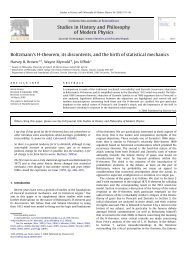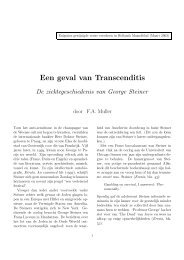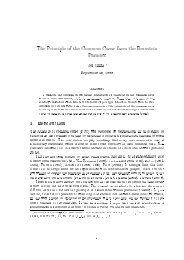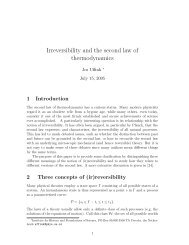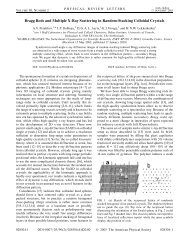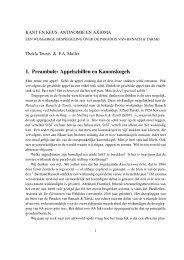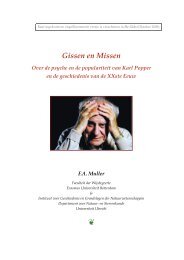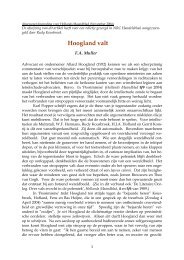Subjective probability and statistical physics
Subjective probability and statistical physics
Subjective probability and statistical physics
Create successful ePaper yourself
Turn your PDF publications into a flip-book with our unique Google optimized e-Paper software.
course, Bernoulli had no rules to offer for how much much the <strong>probability</strong> would have<br />
to change given such information or how to weigh the incompetence of the captain<br />
against the bad maintanaince of the ship <strong>and</strong> so on. But his qualitative message is<br />
clear enough.<br />
For Bernoulli, <strong>probability</strong> is epistemic, it refers to human knowledge, human ignorance<br />
<strong>and</strong> expectation <strong>and</strong> <strong>probability</strong> assignments may differ from one person to<br />
the next, depending on what information they possess. It is not a matter of <strong>physics</strong>,<br />
or objective fact. In this respect, his view can be called a subjectivist. This is not<br />
to say that he would completely side with modern subjectivists in <strong>probability</strong> theory,<br />
like De Finetti (cf. section 3). For those authors, <strong>probability</strong> means a measure of<br />
a rational degree of belief, where rationality imposes some constraint of coherence,<br />
which entails that a person is bound to the usual axioms of <strong>probability</strong> theory, but<br />
otherwise entirely free to assign values in whichever way happens to represent their<br />
personal beliefs, which may well depend on say chauvinism, taste, etc. Indeed, there<br />
is no indication that Bernoulli conceived of the possibility that rational persons, possessing<br />
exactly the same information, might differ in their <strong>probability</strong> assignments.<br />
For him, <strong>probability</strong> is about ‘knowledge’ rather than ‘belief’. So in the second sense<br />
of ‘subjective’, i.e. the sense which refers to the question whether all rational persons<br />
are assumed to agree with each other in their assignments, therefore, his view might<br />
be characterized as objective, or perhaps intersubjective.<br />
2.2 The principle of insufficient reason<br />
Bernoulli’s view on the meaning of <strong>probability</strong> was more or less common to all later<br />
authors until <strong>and</strong> including Laplace, <strong>and</strong> often called ”classical”. It is subjective in the<br />
sense that it refers to a state of mind, but objective in the sense that it does assume a<br />
unique assignment by all rational minds in the possession of the same knowledge. But<br />
such a view can only be applied to practical cases if we have some additional rule that<br />
tells us how to assign numerical <strong>probability</strong> values in actual cases of knowledge. And<br />
that rule should obviously be equally objective, i.e., it should not allow for arbitrary<br />
personal differences of opinion.<br />
Of course, this question, how to assign values to probabilities in a given state of<br />
knowledge, is the really hard one for the classical interpretation. In fact, there is only<br />
one obvious c<strong>and</strong>idate for such a rule: the so-called Principle of Insufficient Reason<br />
(or Principle of Indifference). This principle states that when we contemplate a finite<br />
number of possible events, one <strong>and</strong> only one of them will occur, <strong>and</strong> our mind is<br />
equally undecided about which of will occur, i.e. if the information we possess does<br />
not provide any reason to believe that one or another event is favoured, we should<br />
assign them equal <strong>probability</strong>.<br />
This principle is fraught with difficulty, <strong>and</strong> many authors have commented on its<br />
subtle <strong>and</strong> elusive meaning. For example, one might ask what is meant by ”equally<br />
undecided”, or no event being ”favoured”, or, as Laplace would put it, that all events<br />
in question are ”equally possible”. Reichenbach (1935) argued that this is just a<br />
thinly disguised way of stating that the events are equally probable, so that the principle<br />
would be circular. However, what Reichenbach overlooked was the intention<br />
behind the principle. The very point of the classical interpretation of <strong>probability</strong> is<br />
that a <strong>probability</strong> assignment should represent an epistemic judgment about a set of<br />
3



